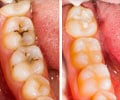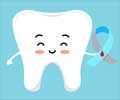Excessive sugar consumption during the festive season can damage the tooth surface, resulting in tooth decay. Here are few simple tips that dentists recommend to follow for teeth and gum protection during this Diwali.
- Excessive sugar consumption during Diwali results in tooth decay
- Plaque formation and acid production are the main reasons for this condition
- Prioritizing oral hygiene measures during festive time can prevent tooth decay
Tooth decay can lead to cavities, which are holes formed in teeth. If tooth decay is not treated, it can cause pain, gum infection, and even tooth loss.
Eating sugary and acidic food promotes bacterial growth and acid formation. The bacterial presence in the mouth sticks to the teeth forming a biofilm called plaque. When plaque remains on the teeth for longer, it accumulates minerals from the saliva and hardens into forming tarts. This can irritate and damage the gums causing gingivitis, tooth decay, and other oral diseases.
The excessive acid formation directly creates holes in the outermost covering of the teeth, enamel. If left untreated, harmful micro-organisms can reach tooth root, and the result usually is a toothache, sensitivity, loosening of teeth, or even swelling of the mouth.
It is thus important to take care of oral health, especially during the festive season. Proper oral hygiene prevents gum disease and tooth decay and promotes a healthier lifestyle and a stronger immune system since many systemic diseases are linked to oral health.
Here are some tips to indulge in guilt-free binge-eating.
Brushing
twice a day for more than two minutes in the morning and night should be followed regularly irrespective tight festive schedule. Brushing They should clean their dentures twice a day.It is advisable not to brush for about 30 minutes after a meal as teeth are covered with remnants of acidic food, which can further weaken the tooth surface.
Flossing
Flossing prevents food particles from sticking in between teeth. It should be done at least once a day. Flossing is a simple step that helps prevent bad breath and also avoids cavities and gum disease.Tongue cleaning
The tongue also harbors harmful micro-organisms, which can lead to bad breath and tooth decay. It is very important to clean your tongue twice a day with a tongue scraper.Mouth rinsing
It is always advisable to rinse your mouth with plain water after eating. This will prevent food particles from sticking to teeth which, in turn, prevents both tooth sensitivity and dental decay.Mouthwashes are an excellent option to prevent tooth decay, gums sensitivity, and oral malodour, but they should be taken only after dentist prescription.
Drink water
Drink lots of water as keeping hydrated allows more saliva production, a natural rinser for the mouth.Stay away from colored foods
Avoid foods high on artificial coloring and carbonated drinks. This can stain your teeth, and the acid in the preservatives can promote bacteria formation. Switching to teeth whitening toothpaste can also help.Sweets first
Sweets directly don't cause tooth decay; they are sticky leading to tooth caries. At times, even rinsing the mouth is not sufficient to eliminate the sugary remains in the mouth. Eating sweets before the main meal can help reduce the risk of the sweets sticking to the teeth.Teeth cleaning
As a preventive measure, consult a dentist for professional teeth cleaning procedure in advance. Along with cleaning, the dentists will also suggest fluoride varnish be applied to the teeth to strengthen the teeth surface.It is highly recommended that people follow these steps and remember that moderation is the key. While it is good to indulge occasionally, one should try not to go overboard.
If one feels any discomfort in teeth during the festive time or after, they must visit a dentist and not delay avoiding things getting worse.
References:
- Hygiene-related Diseases - (https://www.cdc.gov/healthywater/hygiene/disease/dental_caries.html)
- Tooth Decay - (https://www.nidcr.nih.gov/health-info/tooth-decay/more-info)
- Tooth decay - (https://www.nhs.uk/conditions/tooth-decay/)
Source-Medindia
















